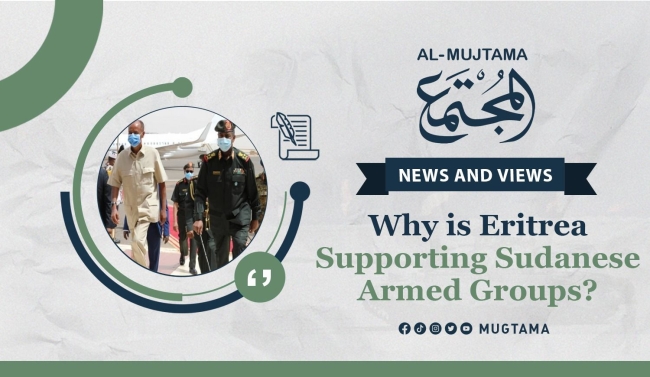Why is Eritrea Supporting Sudanese Armed Groups? Featured
Concerns about Security
Eritrea, a country in East Africa, has been focusing on the security of its borders with Sudan. The eastern region of Sudan, especially Kassala and the Red Sea states, is strategically important to Eritrea because of the long border and the shared ethnic groups on both sides. Eritrea wants to make sure that any war or conflict does not spread to this region.
Security Concerns and Accusations
Eritrea has been concerned about security issues in eastern Sudan, which borders its western and northern borders. The region, especially Kassala and the Red Sea, is strategically important to Eritrea due to the long border and the ethnic similarities between tribes on both sides. Eritrea has accused Sudan in the past of allowing Ethiopian forces to enter through its borders during a war between the two countries, which had a negative impact on Eritrean forces in the region.
Training Camps and Relationships
Eritrea has been establishing training camps for Sudanese fighters on its territory for the past three decades. They have built close relationships with different groups in eastern Sudan, including political, tribal, and societal forces. Eritrea's security services are also active in the region, monitoring opposition factions and Eritrean groups. This shows that Eritrea has good knowledge and intelligence about the region.
Hosting Sudanese Fighters
Although Eritrea has not officially confirmed or denied hosting Sudanese fighters, there are talks and rumors about Eritrea opening camps to train armed Sudanese groups. This is happening because of the ongoing war in Sudan, especially in the eastern part of the country. Eritrea wants to be prepared in case the conflict spreads to its borders.
Proactive Efforts
Eritrea's reception of Sudanese armed forces is part of their effort to build defense points in case of any security chaos caused by the conflict in eastern Sudan. Eritrea is worried that if there is a vacuum in this region, hostile parties might find and support an armed opposition against Eritrea. The long border between the two countries, which has flat areas that are easy to navigate, makes this a concern.
Large Eritrean Community in Eastern Sudan
Eastern Sudan has one of the largest Eritrean communities living abroad. Many Eritreans have sought asylum in UNHCR camps in the region, and there are also Eritreans who have obtained Sudanese nationality. Some of these Eritreans come from tribes historically linked to opposition against the Eritrean government. This makes them a potential source of support for any military action against Eritrea.
Support for the Sudanese Army
Eritrea has maintained a neutral stance towards the war in Sudan, but there are indications of growing support for the Sudanese army. Eritrea's hosting of Sudanese armed groups shows their support for the Sudanese army's war effort. These groups have declared their allegiance to the Sudanese army, and the training camps were opened after a significant event in the war.
Preventing a Siege
The seizure of Al-Jazeera State by the Rapid Support Forces has shifted the geography of the conflict from the capital city, Khartoum, to central and eastern Sudan. Eritrea is concerned about the possibility of these forces reaching the Ethiopian border through Gedaref State. This would give them a supply line through Ethiopia, which could strengthen their position and make it difficult for Eritrea to defend its borders.
If the Rapid Support Forces expand their control in Kassala State and reach the borders of Eritrea, it would put Eritrea in a difficult situation. It would be surrounded by Ethiopia to the southwest, the Rapid Support ally of Ethiopia to the west, and tension with Djibouti to the south. This would limit Eritrea's options and make it vulnerable to conflicts with its neighbors.
Eritrea is also worried about the possibility of Ethiopian forces passing through Sudan to reach western Eritrea. Given the tense relations between Ethiopia and Eritrea, this would further complicate the situation for Eritrea.
Proxy Wars and Negotiations
According to Professor Lionel Cliffe from the British University of Leeds, countries in the Horn of Africa often engage in proxy wars to gain political advantages by supporting armed opposition groups. Eritrea's support for Sudanese armed parties allows it to have a say in the final solutions and settlements during negotiations. By supporting these groups, Eritrea can secure its future interests in Sudan, particularly in the eastern region.
Previous Experience and Allies
Eritrea has had a similar experience in the past when it hosted factions of the Sudanese Eastern Front, which rebelled against the Sudanese government. This led to the signing of the East Peace Agreement in 2006, which benefited Eritrea by creating a safe security environment on its western borders. The Beja General Conference, led by Musa Muhammad Ahmed, and forces affiliated with Omar Muhammad Tahir Omar, have been active in Eritrea. Other groups, such as the United Popular Front for Liberation and Justice and the Eastern Sudan Liberation Forces, have also established training camps in Eritrea.
New Concerns and Armed Movements
Recently, there has been a formation of an armed movement consisting of border tribes historically opposed to the Eritrean regime. This indicates the level of concern among both Eritrea and Sudan regarding security disturbances in eastern Sudan. The commander of the Eastern Sudan Liberation Forces expressed that their movement aims to defend the population of eastern Sudan in case the war extends to the region, to prevent violations against civilians.


